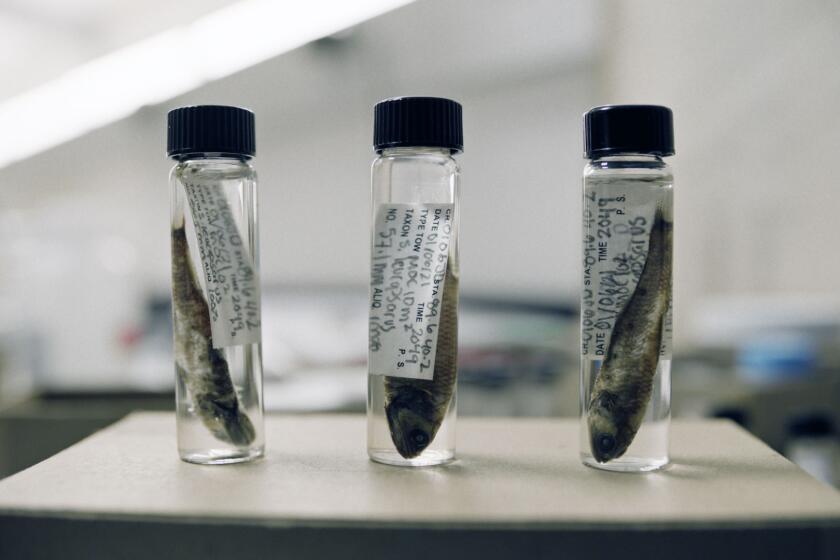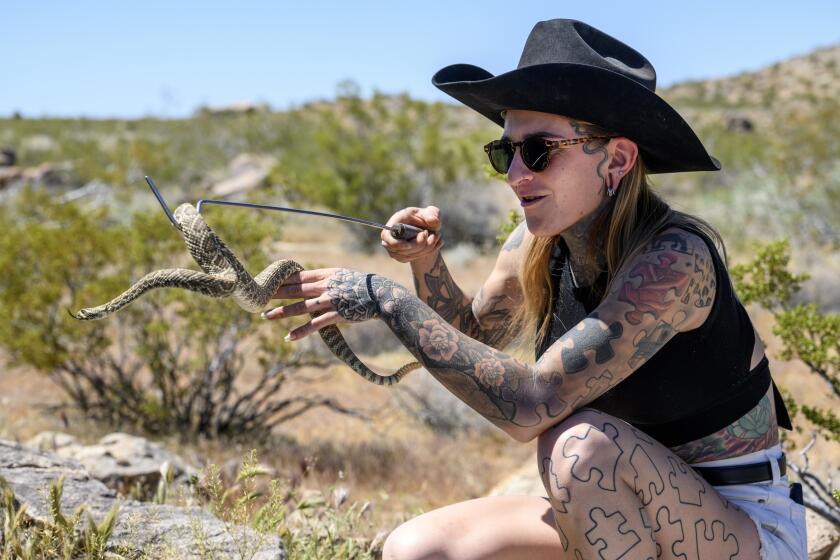Patenting of ‘Invented’ Animals OKd : U.S. to Begin Accepting Applications on Laboratory Life Forms
The federal government, in a dramatic reversal of policy, announced Friday that it will consider applications for patents on new types of animals developed through genetic manipulation.
Once instituted, the new policy would allow inventors to own the exclusive right to create animals they have developed, such as cows that produce more milk or pigs that are resistant to certain diseases. Previously, the government limited such patents to microorganisms and plants.
The decision by the Commerce Department’s Patent and Trademark Office raises a host of moral and scientific questions. No other country currently grants such patents, and several groups, including the Humane Society, say they will mount a campaign to have the new policy rescinded.
‘Profound Implications’
Michael Fox, scientific director of the Humane Society, said the policy carried “profound implications.” Genetic mutants with desirable characteristics eventually may be produced in such numbers that the mutants would outnumber natural breeds of some animals, he predicted.
“It is not an overstatement to say that the decision to patent animals could signify the end of the natural world,” Fox said.
The policy includes all forms of higher life with the exception of humans. In Washington, patent officials said the agency regards the patenting of human life as prohibited by the Constitution.
However, Donald J. Quigg, assistant secretary of commerce and commissioner of patents and trademarks, said the decision would allow human genes to be used in genetic alterations of other animal types. In such an arrangement, a desirable human gene--resistant to a disease, for example--would be isolated and then spliced onto the genetic makeup of another animal such as a chicken. The result would be an otherwise normal-looking chicken that is resistant to the same disease as people.
Quigg said such experimentation might also lead to medical breakthroughs for humans. “Not many months ago we saw technology used to produce red blood cells from white blood cells in the fight against cancer. All you have to do is solve a couple of health problems like AIDS or cancer and it (genetic research) could be worth the money.”
The reversal of policy came after an appellate board of the patent office ruled on April 3 that an extra-large form of oyster produced by a Seattle firm could be considered for a patent. The board held that the oyster fell under a 1980 Supreme Court ruling declaring that Congress intended patents to cover “anything under the sun that is made by man.” Though instigating the change, the oyster application eventually was turned down because the patent office found the process was not sufficiently original.
15 Pending Applications
At present, patent officials said, there are 15 applications for animal patents pending before the agency. They estimated that some of the applications could be approved within the next 18 months. The patent agency has even assigned a new category for the patents: Class 800-Multicellular Living Organisms and Unmodified Parts Thereof.
The new decision will not affect the patent office’s longstanding policy of refusing to patent anything that can be found in the natural world. According to the officials, only those creatures that have been invented by man will be considered for patents under the new policy.
Supporters of the technology say that genetic engineering is a method of developing superior livestock more quickly and efficiently than the current technique of selective breeding. Once genes are isolated, they can improve breeds in one generation, scientists say; selective breeding usually takes many generations to produce results.
Gene Splicing
According to Dr. Bennie Osburn, professor of veterinary pathology at UC Davis, gene splicing is highly specific and will also allow breeders to avoid the defects that sometimes are produced, along with desirable traits, through selective breeding.
Thus far, such efforts have produced only modest results. At UC Davis scientists combined a goat embryo and a sheep embryo 18 months ago to produce a creature known as a “geep.” At the University of Maryland a faster-growing pig has been produced with mixed results; the pig has the same type of defects associated with selective breeding techniques.
Osburn estimated that a decade may pass before any dramatic progress is made with genetic manipulation of animals. At present, he said, only a few basic genes, such as a bovine growth gene, have been isolated. No genes relating to disease resistance have been isolated, he said. Most university research on biological engineering is now being carried out at three institutions: UC Davis, the University of Wisconsin and the University of Pennsylvania.
The predictions of leaner pigs and more productive chickens has not assuaged the opponents of the new policy. On Friday a coalition of groups vowed to take their case to Congress, where they will ask for legislation to rescind the decision.
‘Brave New World’
“In one regulatory stroke, the U.S. Patent Office has moved the U.S. society into the ‘brave new world’ that Aldous Huxley warned of many years ago,” Jeremy Rifkin, president of the Foundation on Economic Trends and a longtime critic of genetic engineering, said in a prepared statement. “We have a policy that could allow corporations to monopolize the genetic code of all forms of animals. This policy is unconscionable and morally repugnant.”
At the Humane Society, Fox disputed the theory that gene splicing would avoid the defects of selective breeding. He predicted that entire generations of new animals would suffer from crippling and agonizing defects such as susceptibility to diseases, bone disorders, and so forth.
Fox also predicted that the policy opens the door to human engineering, no matter what the patent office says. “The same promises of improved this and improved that will lead, inevitably, to tinkering with the human being,” he said.
More to Read
Start your day right
Sign up for Essential California for news, features and recommendations from the L.A. Times and beyond in your inbox six days a week.
You may occasionally receive promotional content from the Los Angeles Times.






